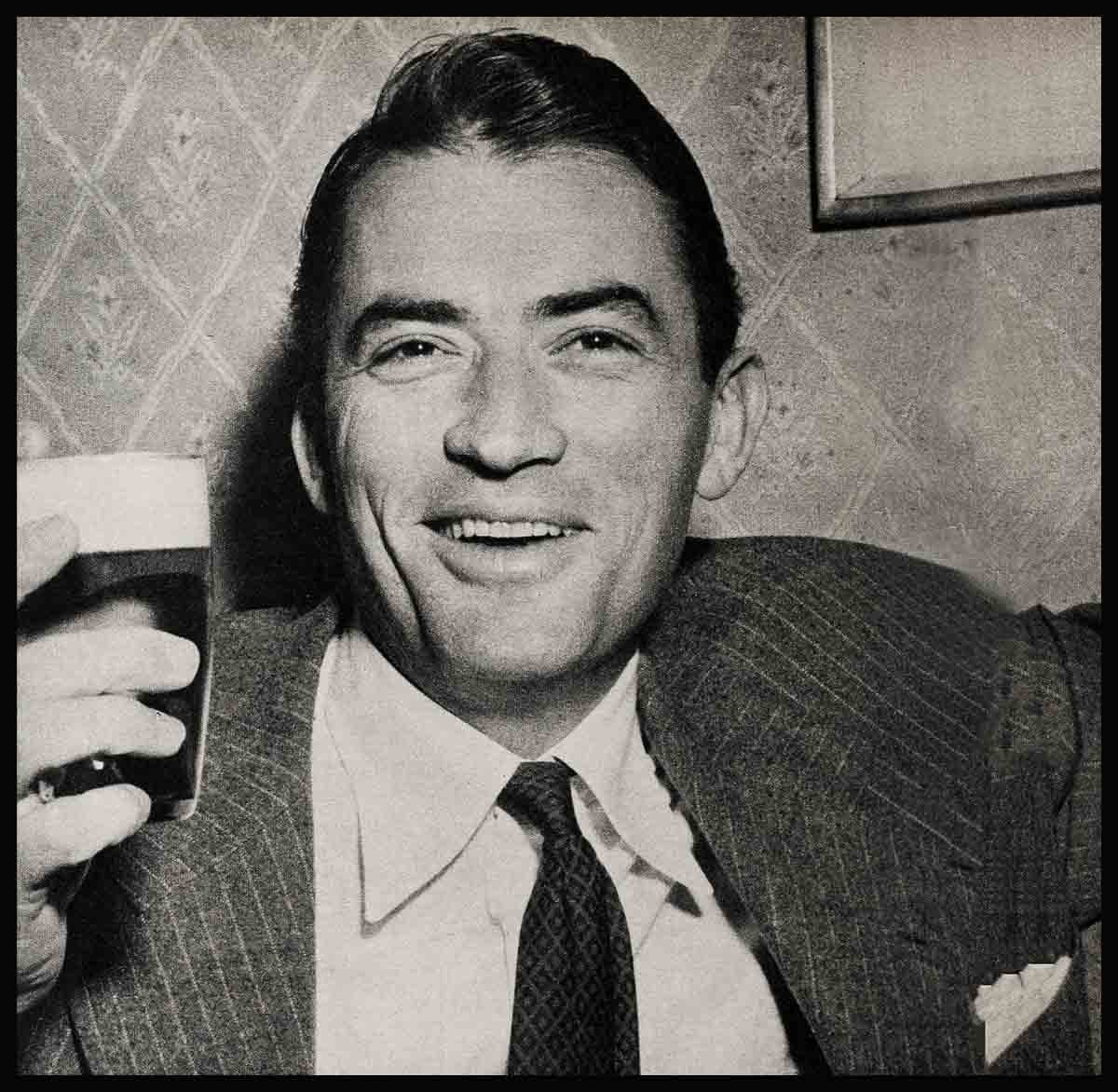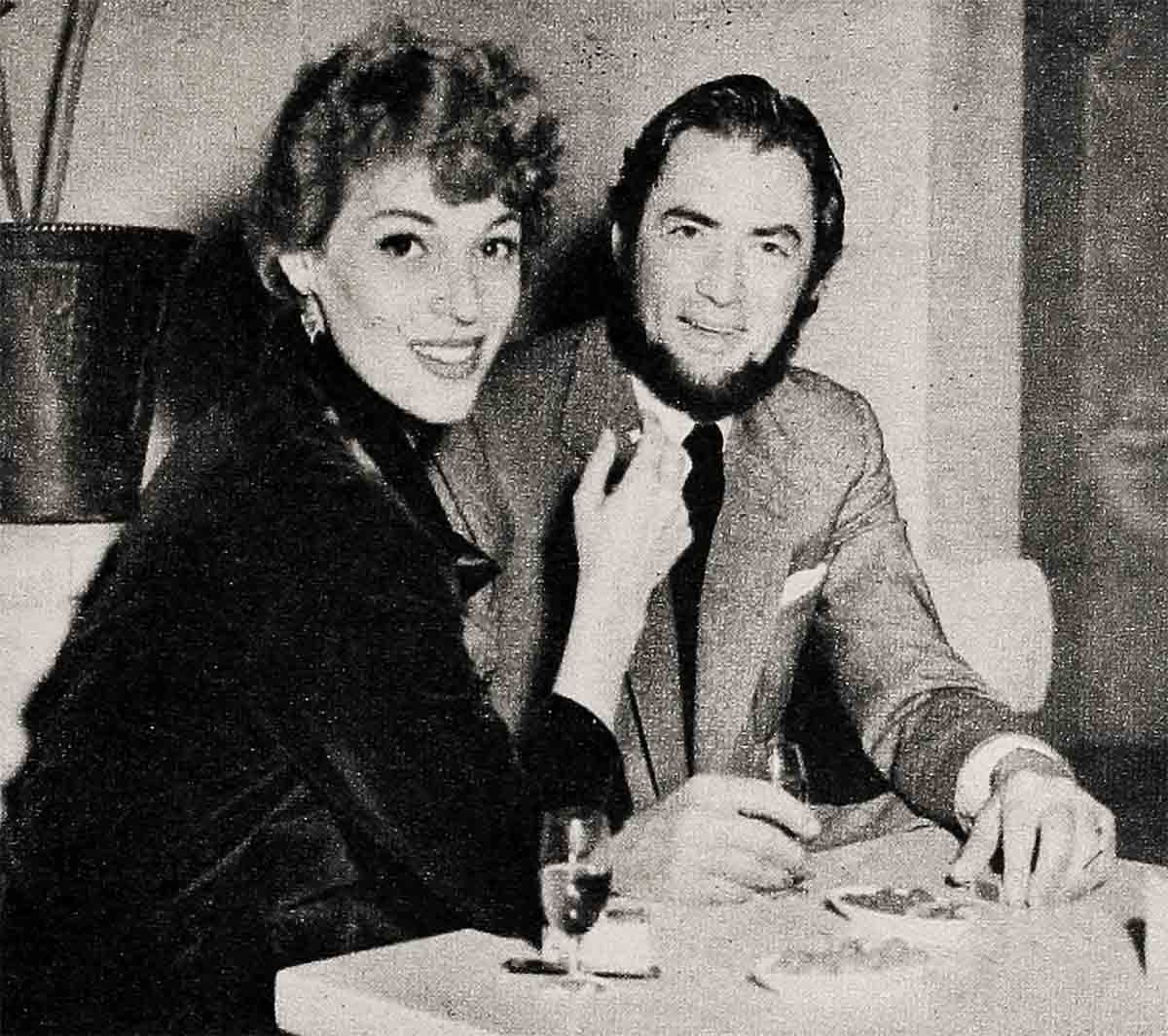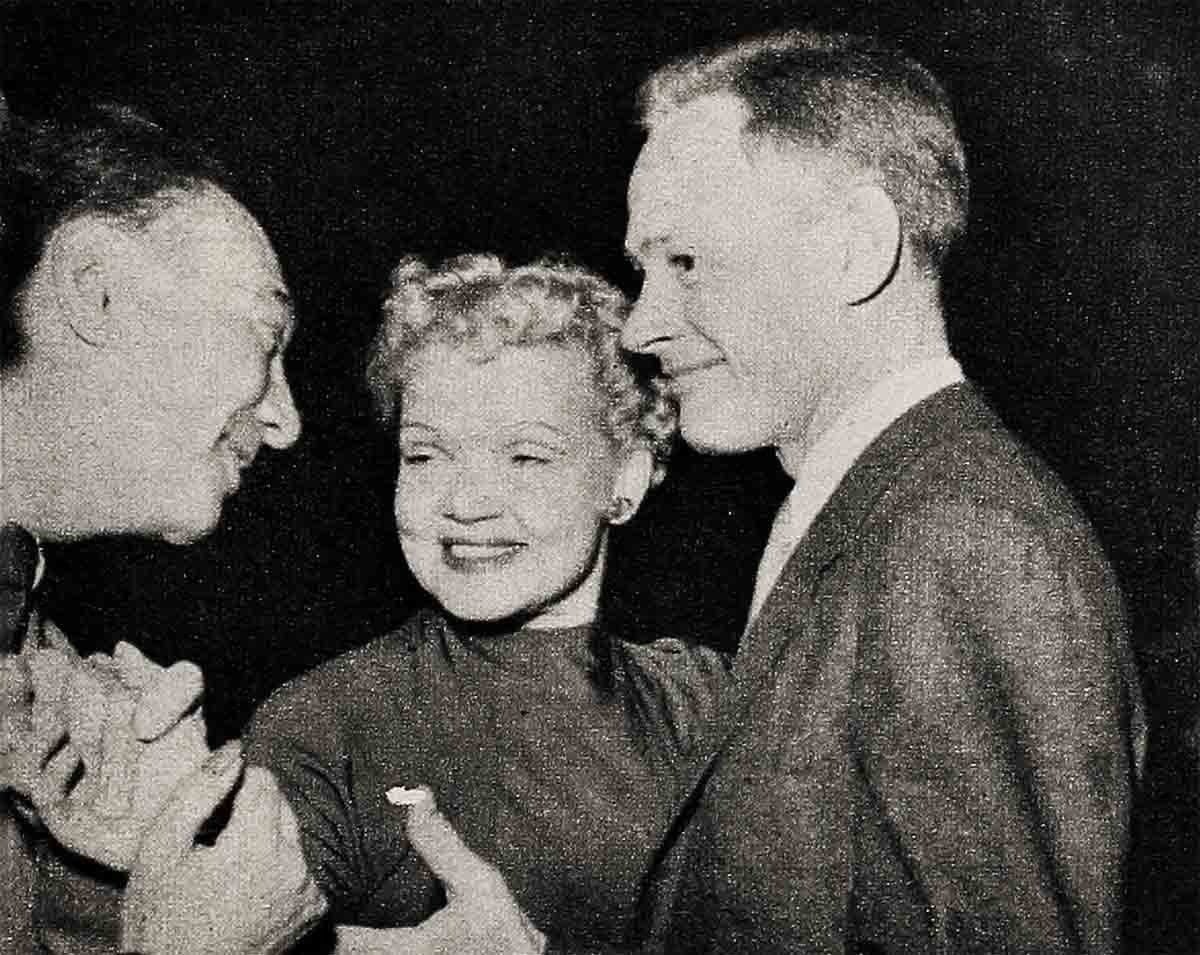
Gregory Peck and Veronique Passani: Hollywood’s Biggest Question Mark
Three years ago a dark-haired French girl named Veronique Passani confided to a friend that one day she would marry Gregory Peck.
This friend; who had been a schoolmate of Veronique’s at Marymount and L’école des Oiseaux in Paris, was startled.
“You must be crazy,” she said. “Gregory Peck is already married. I read only yesterday that he is here in Paris with his wife and three sons.”
Veronique, then twenty, smiled and reportedly said, “You will see.”
Gregory Peck’s divorce is not final until December 29, 1955, but it would surprise none of his friends if long before then he married Veronique, his twenty-three-year-old traveling secretary, in Paris or London or the Canary Islands.
Peck, of course, denies this. He was on location in the Canary Islands—Veronique was there, too—finishing Moby Dick when Greta Konen Peck, mother of his children, filed for divorce in Los Angeles. Asked if he contemplated another marriage in the near future, Greg, a man of few words, answered with one: “No.”
But at the same time, the Paris newspapers carried on their front pages the announcement that Veronique Passani and Gregory Peck were engaged. Veronique’s mother, a divorcée of Russian extraction who lives with her eight-year-old son in an apartment on the Boulevard Franklin Roosevelt, was telephoned by a reporter.
“Madame Passani, is it true that your daughter is engaged to marry Gregory Peck, the American film star?”
“I don’t know,” Veronique’s mother answered.

“But the newspapers are filled with stories to that effect.”
“I’ve seen them.”
“Are they true?”
“All I can say,” Madame Passani volunteered, “is that my daughter has known Mr. Peck for, say, three years. They have much affection for each other, but beyond that I cannot say. I know nothing of their plans.”
“Is it possible that they are honeymooning right now in Las Palmas, in the Canary Islands?”
“I am sorry, Monsieur. I really don’t know.”
Like her daughter, Madame Passani is a journalist. She writes for the France Dimanche—and she is skilled in the art of being politely evasive. She did admit that for a number of years her daughter has worked for Greg as a combination interpreter-secretary.
It was as a reporter, however, that Veronique first met the Hollywood star. She was working for the Paris Presse three years ago and was assigned to interview Gregory Peck. She never had met Greg, but she is an aggressive and resourceful girl. She called Paramount’s publicity office in Paris.
The office was being run then by a handsome, charming man named Eduard de Segonzac. As de Segonzac recalls the incident, “She phoned and there was a good deal of urgency in her voice. She said that she knew Greg was in Paris. She knew he was on his way to Rome to make Roman Holiday with Audrey Hepburn. And she must have an interview. I told her to come for lunch. That’s how she met Greg.”

Now what Peck saw in this thin-faced brunette, few of his friends have been able to determine. What he sees in her now, of course, is charm, companionship, competency, love, an attractive figure and a continental savoir faire. But at that time, Veronique wasn’t particularly well-groomed, sophisticated or appealing. And what attracted Greg is still a mystery.
One acquaintance says, “The truth is that Veronique came around exactly at the right time in Peck’s life. He and Greta were fighting and their arguments were no secrets in Europe. By contrast, Veronique must have seemed docile and pliable.
“Of course, Greg has since learned that this young lady has a will of iron, an ability to fight and struggle and survive characteristic of so many Europeans.
“Anyway, she has a nifty figure, and as I say, she moved in at a propitious moment.”
In the light of Greta Peck’s divorce testimony, this analysis seems to be valid, because a few weeks ago Greta testified in the California Superior Court that she and her three children went to Paris in 1952 to be near her husband. She rented a large home which she regarded as comfortable but which Greg described as “this miserable cold barn.”
So terrible did he consider his surroundings that “he stayed away from home nights and wouldn’t tell me where he had been or where he was going or what he was doing.”
According to Mrs. Peck, a crisis in their domestic affairs was reached on the night Dr. and Mrs. Voskamp had a party in their Paris apartment for Greta and Greg.
“My husband stayed for half an hour,” Greta testified, “then took his hat and coat and walked out before dinner. I followed him to the door and asked him if he wanted me to go with him. He said it made no difference whether I did or not.”
On another occasion, “My husband told me, ‘We would be better friends if we were not married.’ ”
It was then that Greta Peck bundled up her three sons and took the first boat back to America, leaving her tall, enigmatic husband to the plans and designs of Veronique who was by then completely gone on him.
When Greta Peck returned to Hollywood, she must have known in her mind that her marriage was finished, but in her heart she nurtured the hope that Greg might change, that remembering his own youth in a broken home, remembering the poverty and struggle of their early married days, he might give up the European whirl.

She declined to admit that her marriage was on the rocks. “It’s just very difficult raising three boys in Europe,” she maintained, “so we came home.”
There was no mention of Veronique, of the quarrels, the mental cruelty, the general incompatibility. Instead, there was a good deal of whistling in the dark.
“Greg is a man,” Greta told inquirers, “and it is only natural that he will occasionally go out with girls while he’s in Europe. Certainly, there’s no harm in that.”
But Greg didn’t go out with girls. He went out with one single girl—Veronique Passani—and while he insisted, “She’s just a friend,” no one believed him. They were inseparable. Everywhere Greg went—London, Paris, the Riviera, Italy, Switzerland, Ireland, Ceylon—Veronique went with him or followed him.
Greta Peck hoped that somewhere along the line Greg might drop Veronique in favor of playing the field, an infinitely less dangerous game—but Veronique has a lot on the ball, and she had then, and still has, no intention of letting Greg escape.
An actor who is a good friend of Peck’s took him aside about a year ago and diplomatically tried to explain that Veronique was not the girl for a plain boy from La Jolla, California, and generally tried to discourage the entente. Peck paid no heed.
Veronique is shrewd and intelligent and at least one of her friends is convinced that “she’s too good for Greg and should never marry him.
“Greg is tall and quietly handsome,” this friend says, “and he’s earning about $600,000 a year, and I guess you’d call him a terrific catch. But somehow I think Veronique is not his type.
“Veronique is well stacked, no doubt about that. But she is not particularly beautiful or glamorous, and she is primarily an intellectual. She is twenty-three and Greg is thirty-nine. There is a great difference in their backgrounds, their ages, their religions and their outlooks.
“Greg is a very stolid sort of person. Veronique is not, although she changes her own personality as a sop to his ego. This practice is all very well and good when a girl is playing up to a man, but in marriage it won’t work.
“I know I’m playing the heretic in advising Veronique not to marry Greg, but Ive seen the two of them together in Paris. I’ve seen them in Ceylon and at John Huston’s house in Ireland. And I just don’t think it will work.”
Veronique, needless to say, does not share this opinion. She is very much in love with Peck, and if he doesn’t marry her eventually she is going to be one of the most disappointed and unhappy girls in Europe.
Peck will discuss pretty nearly every subject except his love life. Recently, someone tried to discover what makes him tick—why he’s done the things he has and why he has stayed abroad for such long periods.
“Primarily,” he answered, “I’m interested in enlarging my horizon as an actor. If I’ve spent periods abroad, it’s because I think work in London can be just as enriching as work in Hollywood. It broadens an actor.”
“But there was a time,” Greg was told, “when you didn’t want to be an actor. You wanted to be a doctor. Isn’t that true?”
“That was a long time ago,” Peck admitted. “But when I saw I couldn’t become a doctor (family finances) I became an actor, and I’m happy with my lot.”
“As an actor; do you think good looks and a good physique count very much?”
“What counts most,” Peck believes, “is presence and personality and inner truth.” As for happiness, “It consists of physical and moral satisfaction. People must be themselves, act themselves, know themselves and accept themselves for what they are.”
Peck was then asked what he thought of love. “It’s not a big thing,” he explained. “When it comes it always surprises me. But then again, love is not something one thinks about. It’s something one feels.”
“How about your opinion of women? Do you find beauty an essential for attraction?”
“Personality,” Greg answered firmly, “counts more than beauty, because when beauty dies of old age, personality still exists. What counts in a woman is charm, and receptiveness, dignity and naturalness, good manners and intelligence.”
Veronique Passani happens to be endowed with all of these qualities. So is Greta Peck. She is sweet, charming and every inch a lady.
How did Greg come to fall out of love with this delightful little blonde woman, the mother of his three handsome, healthy sons?
One hears many stories—that Greta is thrifty and Greg is not, that Greta is conservative and Greg is liberal, that Greta loves California and Greg loves to travel. In truth, there is no simple, specific answer.
As a father, his behavior has always been above reproach. As a gentleman he stands in a class all by himself. And as a provider for his family—just look at the financial settlement he made with Greta. She is to get $55,000 a year in alimony plus $750 a month for the support of the children. In addition she receives one half of the community property which consists of a $200,000 home, insurance policies and one half of Peck’s percentages in three motion pictures. After 1965, she will receive ten per cent of Greg’s earnings until she remarries.
This adds up to a sizable amount of money. But in the event Veronique Passani becomes the second Mrs. Peck, she needn’t worry. There will be plenty left for her. In the last twelve years Eldred Gregory Peck has become one of the most highly-paid screen lovers in Hollywood’s hectic history.
THE END
—BY STEVE CRONIN
It is a quote. MODERN SCREEN MAGAZINE APRIL 1955




